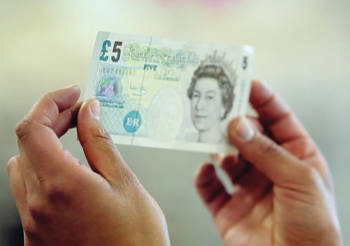
 There a many good things to consider about banknotes printed on polymer, a form of plastic. They are cleaner, more secure, more durable, hence cheaper than cotton paper banknotes. More than twenty countries already use them: New Zealand, Romania, Vietnam or Chile amongst others. In the UK (or close to), the first plastic banknote was issued by The Isle of Man, in 1983. But, due to ink problems, the £1 note was withdrawn five years later. Then, to celebrate the year 2000, the Northern Bank of Northern Ireland released a commemorative £5 note, in 1999, also printed on polymer. Survivor of the post-2004 robbery recall, this one is still in circulation.
There a many good things to consider about banknotes printed on polymer, a form of plastic. They are cleaner, more secure, more durable, hence cheaper than cotton paper banknotes. More than twenty countries already use them: New Zealand, Romania, Vietnam or Chile amongst others. In the UK (or close to), the first plastic banknote was issued by The Isle of Man, in 1983. But, due to ink problems, the £1 note was withdrawn five years later. Then, to celebrate the year 2000, the Northern Bank of Northern Ireland released a commemorative £5 note, in 1999, also printed on polymer. Survivor of the post-2004 robbery recall, this one is still in circulation.
Earlier this year, in March, the Clydesdale Bank put a limited edition of two million £5 plastic notes into circulation. A little bit smaller than the previous ones, it celebrates the Forth Bridge 125th anniversary and was issued a year before the Bank of England releases its own polymer banknotes. A new £5 note, featuring Sir Winston Churchill, will enter circulation in the second half of 2016, followed a year later by a new £10 note featuring Jane Austen. The £20 banknote will be released in 2020, but its main character has not been chosen yet: The Bank of England's Banknote Advisory Committee has to reduce a 29 700 candidates list to three to five finalists. Then Mark Carney, the Bank's governor, will have the last word. Ultimately, all four nations of the UK will feature on the banknotes.
*Photo: Bank of England
News in the same category
Based on consumer research, supermarkets are cited as being a leading source of plastic based waste although some are adopting methods to reduce their plastic footprints. However, it's not the responsibility of the big players to begin creating a shift.
This means that some Londoners (and soon all of them) can benefit from Amazon's one hour delivery service on a selection of more than 10,000 products.
This is an ambitious project: Sainsbury's is about to launch a £10 million plan to fight food waste, and is searching for a test town.
Seen as the future in world food, edible insects are being transformed for the more reticent. While Micronutris raises them and produces chocolates, crackers and biscuits, Ento is going for innovative restaurants.




